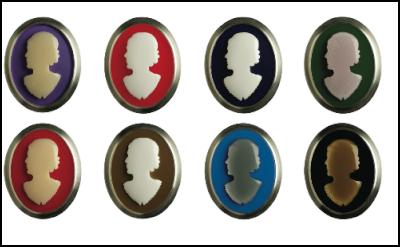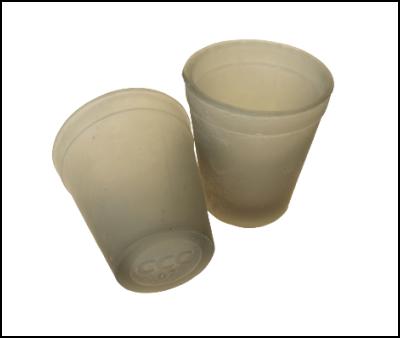Introducing Govett-Brewster Editions
Introducing Govett-Brewster Editions

As part of its fortieth
anniversary year, the Govett-Brewster Art Gallery is proud
to announce the launch of Govett-Brewster Editions, a new
collaborative venture whereby artists are invited to work
with the Gallery to develop collectable, limited edition,
contemporary art works.
Gallery Director Rhana Devenport notes, “The Editions offer fresh avenues for artists and are a Govett-Brewster Foundation initiative to further support the Gallery and its Collection. The unique collaborative process with the artist is at the heart of these Edition projects.” Editions will be produced each year, with at least one unveiled at the annual Govett-Brewster Foundation dinner.
The inaugural Edition is a stunning range of unique cameo brooches by Auckland artist Octavia Cook. Cook has earned a strong reputation as one of New Zealand’s finest jewellers. Her impeccably crafted cameos constructed from precious metals and acrylic reference nineteenth century memento mori jewellery, portraiture and genealogy.
This ten-brooch individually coloured edition features the profile of the Govett-Brewster’s founding patron Monica Brewster (nee Govett). Monica Brewster envisaged a contemporary art museum of international standing that would offer a window to the world in the small coastal community of New Plymouth. She realised her dream through a generous gift and a subsequent bequest to the city that established the Gallery and its Collection in 1970. Octavia translates Monica’s profile into exquisite, wearable art. Each brooch is presented in a black velvet case. NZ$2,000 each.

Whanganui-based media
artist Julian Priest has collaborated with glass artist Sue
James to create the second Govett-Brewster Edition, a
limited run of Cathode Coffee Cups.
Comprised of recycled glass from the front face of discarded computer screens, the idea for the Cathode Coffee Cup stems from the environmental issue of e-waste, a concern that Priest has addressed in previous exhibitions. E-waste loosely includes discarded, surplus, obsolete, or broken computers and other electronic devices which can contain toxic heavy metals such as cadmium, lead and mercury; what Priest refers to as “the physical outputs from the world of information”.
The cups are cast in the shape of another infamous material object of disposable culture, the polystyrene cup. In doing so, Priest pays homage to the computer programmer who one imagines sitting at their computer writing lines of code while endlessly consuming coffee from a disposable cup.
Additionally, the Cathode Coffee Cups have been registered with Creative Commons, meaning that the buyer is free to ‘Share’ (copy, distribute and transmit) and ‘Remix’ (adapt) the work. The ‘CCC’ logo at the bottom of each Cathode Coffee Cup is says Priest, “An extension of Creative Commons into the physical world. Where Creative Commons is promoting ‘open source’ [free] software which is essentially just recycling and reusing code, these cups are recycling and reusing a physical piece of computer hardware.”
The cups are all essentially ‘one-offs’, being cast from their own mould which Sue James creates using a time-intensive, 28-step ‘lost-wax cast’ method. Each cup is labelled with its edition number using the hexadecimal numbering system, common in the language of computer programming. NZ$256 each.
ENDS


 Health Coalition Aotearoa: New Bill A Vital Step Towards Tobacco-Free Future In Aotearoa
Health Coalition Aotearoa: New Bill A Vital Step Towards Tobacco-Free Future In Aotearoa National Youth Theatre: 140 Christchurch Kids Shine In National Youth Theatre’s Historic CATS Premiere
National Youth Theatre: 140 Christchurch Kids Shine In National Youth Theatre’s Historic CATS Premiere NZ Symphony Orchestra: NZSO To Tour Masterworks By Mozart, Beethoven, Haydn And More
NZ Symphony Orchestra: NZSO To Tour Masterworks By Mozart, Beethoven, Haydn And More Journal Of Public Health: Vape Shops Cluster Around Schools
Journal Of Public Health: Vape Shops Cluster Around Schools Timaru District Council: Aigantighe Art Gallery Hosts An Iconic Robin White Touring Exhibition
Timaru District Council: Aigantighe Art Gallery Hosts An Iconic Robin White Touring Exhibition Victoria University of Wellington: Dame Winnie Laban Awarded Honorary Doctorate Recognising Achievements For Pasifika
Victoria University of Wellington: Dame Winnie Laban Awarded Honorary Doctorate Recognising Achievements For Pasifika 